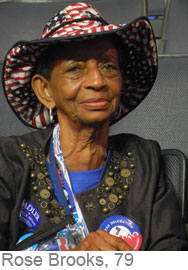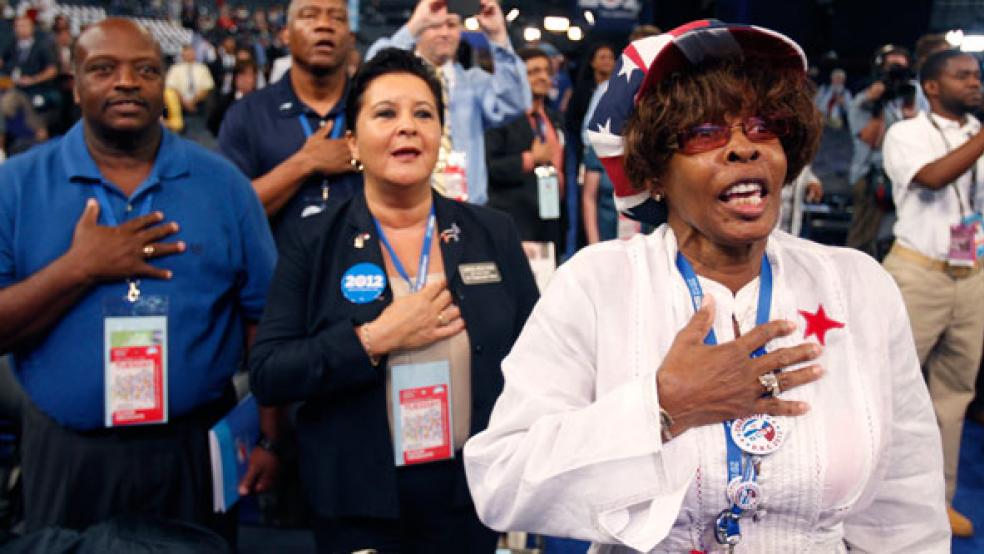Charlotte, N.C. – Ginnie Watson, a 59-year-old first-time delegate from Gastonia, N.C., doesn’t dwell on the significance of having a black family in the White House or a black woman like herself as first lady. One of 1,500 workers who lost jobs in 2006 when Continental Tire moved production to Mexico, she now struggles on a fraction of the income she earned as a $22-an-hour tire inspector.

Four years ago, Barack Obama’s election generated tremendous pride in Watson as it did the rest of the African-American community. The president and Michelle Obama, both Harvard-trained lawyers, serve as role models for her four adult children, two of whom graduated college. “I knew all my kids had potential,” Watson said. His election in 2008 “re-instilled for them that they can be anything they want to be; do anything they want to do.”
But that pride has given way to some disappointment over her economic circumstances and a lot of anger – not at Obama, but at the Republicans who she says worked to stop him from implementing his program. “If it hadn’t been for the Republicans plan out of the gate to stop everything he tried to do that was for the people, we’d be a lot further along,” she said.
The question now is whether the disappointment will triumph over the anger and dampen enthusiasm among African-American voters in November. Watson, who became active in Democratic Party politics after losing her job, says no. She plans on working hard at turning out voters in her community.
But for thousands of others who aren’t plugged into the day-to-day excitement of politics, the failure to see major improvements in their economic fortunes might keep them at home. Obama won North Carolina by fewer than 14,000 votes four years ago. High turnout among African-American voters will be crucial if Obama is to have any chance of keeping this state and swing states like it in the Democratic column.
And that’s where Michelle Obama’s winning performance as a team-playing first lady over the past four years won’t be of much help to her husband. Ann Romney, during her successful convention speech last week, provided a more likable image for her husband, Republican standard bearer Mitt Romney.
But most Americans already like Barack Obama. The president would probably win any popularity contest between the two candidates in a landslide.
Yet the first lady’s speech Tuesday night largely stuck to her supportive role rather than firing up the party’s base, a role she has avoided since being briefly branded as a hard-edged firebrand for comments at the 2008 convention that she was proud of her country “for the first time.” The New Yorker magazine spoofed the characterization by showing her sporting an Afro and brandishing a rifle.
But her time as first lady has more than erased that image. She’s worked tirelessly on behalf of the nation’s military families and launched a much-needed campaign to promote exercise and better eating habits to help stem the nation’s obesity epidemic. With those causes as her centerpiece, she has rallied the public behind the Obama administration’s initiatives in a mostly traditional way: quietly, by his side and in a way that puts family – hers and others – at the center of her life.
Only once during her speech did she touch on the main issue confronting the nation – the lack of robust employment growth. After highlighting how Barack Obama “brought our economy back from the brink of collapse to creating jobs again,” she said that “in the end, these issues aren’t political. They’re personal. Barack knows the American dream because he’s lived it and he wants everyone in this country, everyone, to have the same opportunity.”
She repeatedly returned to the theme that the first couple’s lives represented a particularly kind of American success story, not the one that Republican standard bearer Mitt Romney claimed Obama was attacking. “For Barack, success isn’t about how much money you make. It’s about the difference you make in people’s lives,” she said.
And the way Americans have traditionally done that, she said, was by parents sacrificing for their children and grandchildren. “In the end, more than anything else, that is the story of this country,” she said. “At the end of the day, my most important title is still mom in chief.”

There were plenty of African-American women sprinkled through the convention hall for whom that message resonated. For older black women at the convention, the pervasive images of the close-knit Obama family and Michelle’s willingness to set aside her legal career during her husband’s meteoric rise to high office provides a welcome confirmation of their own conservative family values. “She’s what every woman should be – a wife to her husband,” said 62-year-old Gloria Battle, a delegate from Deerfield Beach, Florida.
Mother of a 25-year-old daughter who still lives at home – “she’s an old-fashioned girl; she won’t get out until she’s married.” Battle spent the past 20 years directing Broward County’s human rights program, investigating employment and housing discrimination complaints and fighting for equal treatment of people suffering from HIV/AIDS. “When you look at career women, it’s not like we put our careers on hold for our families,” she said. “It’s more that we do what we have to do to get things done.”
 Rose Brooks, 79, who is attending her seventh Democratic Party convention, doesn’t need a role model to get her fired up about the coming election, although there’s not much to support her optimism about turning deep red Texas into a blue state. Sitting patiently in Time Warner Arena five hours ahead of Michelle Obama’s speech, she marveled at the similarities of careers whose disparate possibilities were more a product of their time and place than their circumstance.
Rose Brooks, 79, who is attending her seventh Democratic Party convention, doesn’t need a role model to get her fired up about the coming election, although there’s not much to support her optimism about turning deep red Texas into a blue state. Sitting patiently in Time Warner Arena five hours ahead of Michelle Obama’s speech, she marveled at the similarities of careers whose disparate possibilities were more a product of their time and place than their circumstance.
Brooks worked her way through Houston-Tillotson College, an historically all-black school in Austin. Shortly after President Lyndon Johnson launched the war on poverty, she went to work for the Job Corps, one of its most successful job training programs. She stayed for the next 34 years, raising three children who have given her three grandchildren, the youngest of whom, a college graduate, recently married an Air Force captain.
“I had to work my way through school just like her,” Brooks said. “She’s a fine family lady. I read about her struggles and I think that is something people can relate to.”





